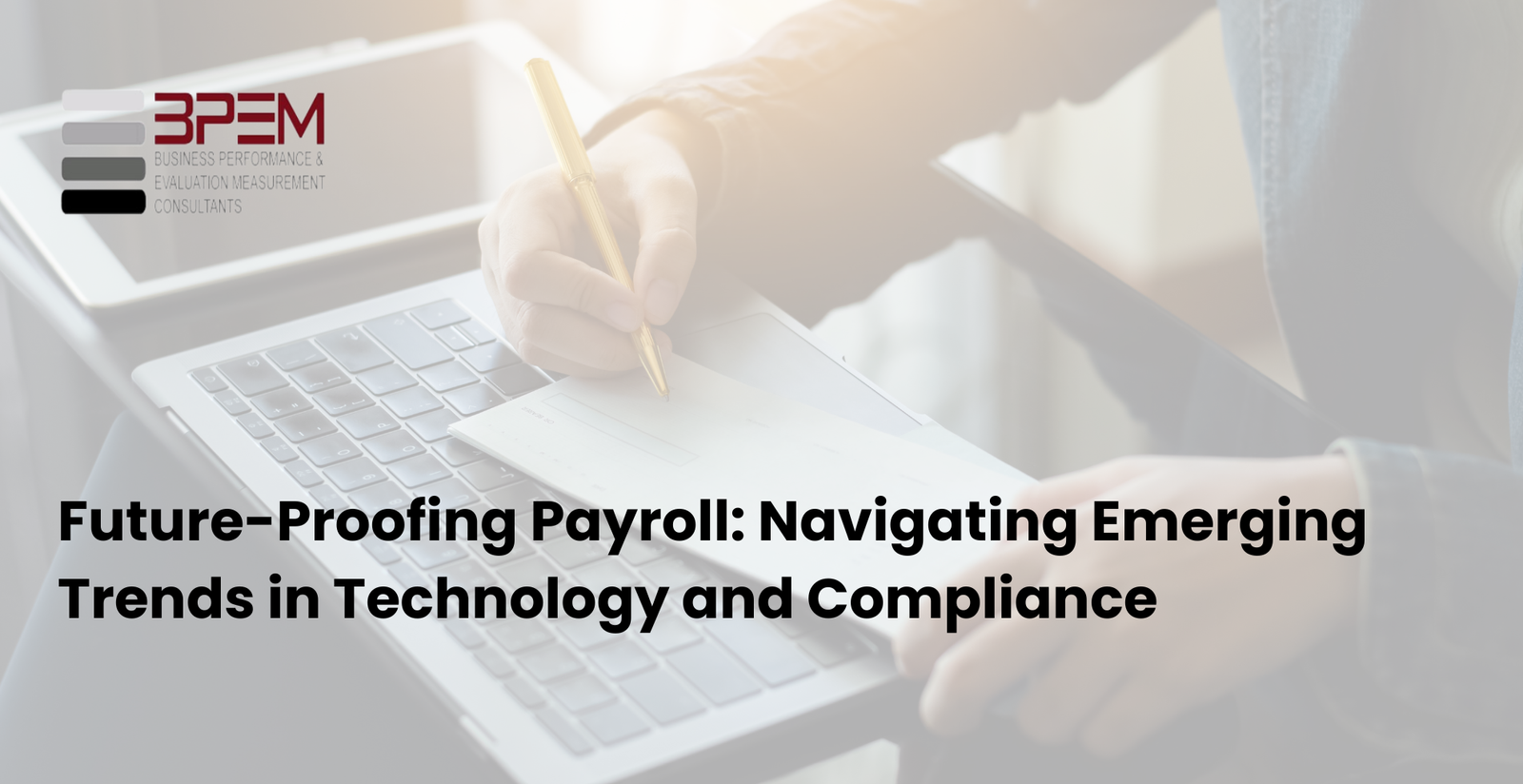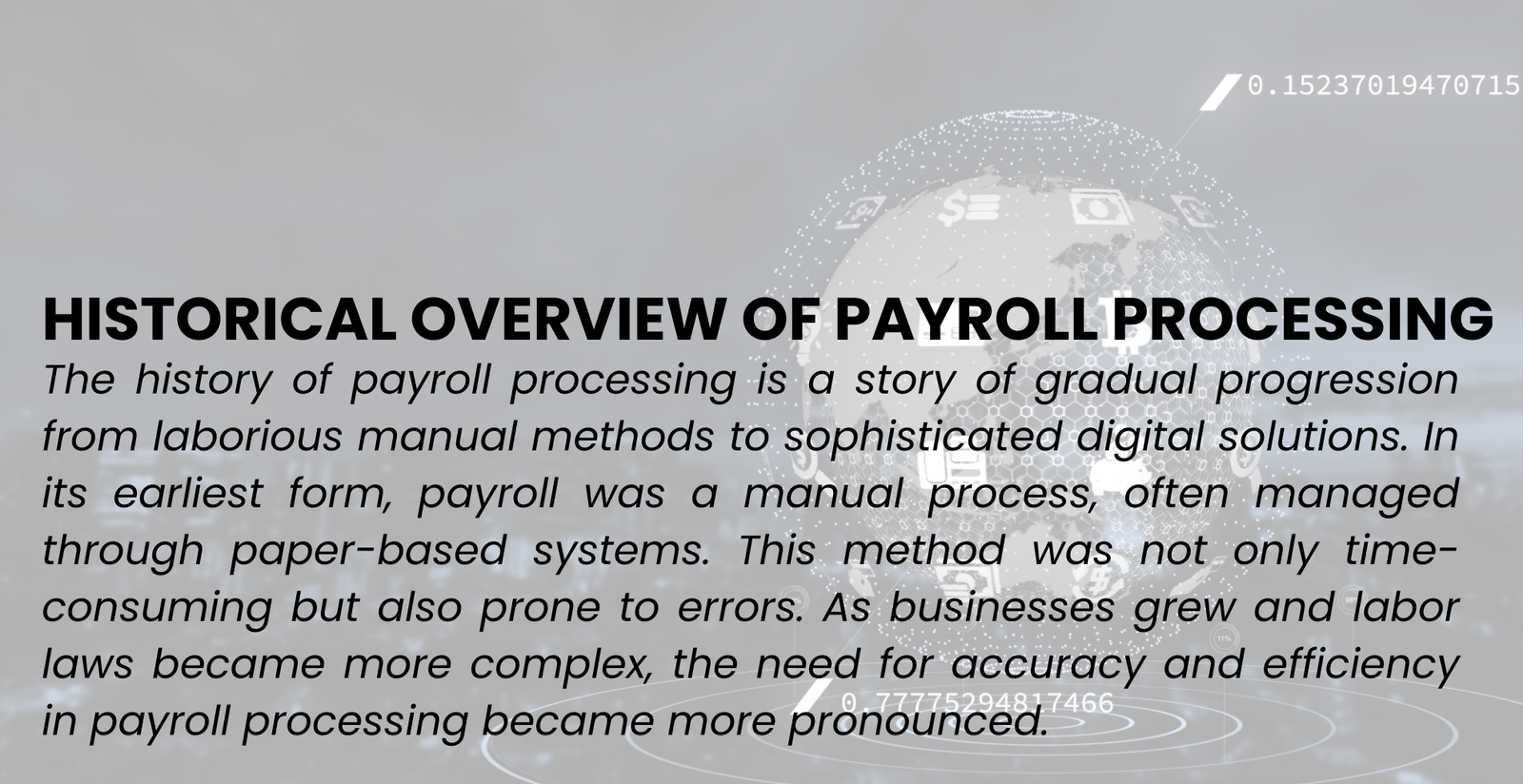
Future-Proofing Payroll: Navigating Emerging Trends in Technology and Compliance
In the steadily developing universe of business, the domain of finance handling remains a basic capability, one that has gone through huge change as of late. This transformation has been impelled by fast progress in innovation and a unique administrative scene that requires steady carefulness and variation. In that capacity, understanding the arising trends in innovation and consistency isn’t only helpful but fundamental for associations meaning to remain ahead in this aggressive and complex climate.
The significance of this understanding couldn’t possibly be more significant. Payroll is more than just a financial transaction at its core; it’s an impression of an organization’s obligation to its representatives, encapsulating trust and effectiveness. Mechanical headways have opened new roads for exactness, speed, and security in finance handling, on a very basic level, modifying how associations deal with this basic capability. From cloud-based frameworks offering continuous information access to man-made intelligence-driven instruments that anticipate and adjust to regulative changes, innovation is reshaping the finance scene.
However, these advancements come with new difficulties, particularly in compliance. The administrative climate encompassing finance is multifaceted and steadily changing, with varieties across various areas and ventures. Remaining consistent guarantees lawful adherence as well as shields an association’s standing and its relationship with workers. It’s a sensitive equilibrium, dealing with the productivity and development presented by new innovation while exploring the intricacies of consistency necessities.
This blog expects to act as a signal in this powerful climate, offering experiences and direction on exploring these arising patterns. We want to give businesses the tools they need to safeguard their payroll systems for the future by delving into and explaining the intricacies of modern payroll management. Through this investigation, associations can learn how to adjust to current changes as well as how to expect and get ready for future turns of events. This proactive methodology is pivotal in guaranteeing that finance stays in a consistent, secure, and agreeable cycle, mirroring the developing necessities of both the business and its labor force.
In the accompanying areas, we will dive into explicit mechanical patterns, talk about consistency challenges, and give significant techniques to assist organizations with remaining at the cutting edge of finance handling. Whether you’re a little startup or a global partnership, understanding and carrying out these patterns is critical to building a powerful, future-verification finance system.
Table of Contents

The Evolution of Payroll Processing
The excursion of finance handling is an intriguing story of development, set apart by mechanical headways and a steady quest for effectiveness and precision. This advancement has been critical, molding the way that associations oversee finance as well as how they cooperate with their representatives.
Historical Overview of Payroll Processing
The historical backdrop of finance handling is an account of the steady movement from difficult manual strategies to complex computerized arrangements. Payroll was initially a manual process that was frequently managed via paper-based systems. This technique was tedious as well as inclined to blunders. As organizations developed and work regulations turned out to be more perplexing, the requirement for precision and proficiency in financial handling turned out to be more articulated.
The presentation of electronic finance systems in the last 50% of the twentieth century denoted a critical jump. These frameworks smoothed out the finance cycle, diminishing manual exertion and limiting mistakes. Essential programming arrangements developed into additional complicated applications fit for dealing with different finance capabilities, from working out pay and duties to overseeing worker information. The foundation for the subsequent phase of payroll evolution was laid by this digital transformation.
Recent Shifts in Payroll Technology
The latest changes in finance innovation have been completely progressive, driven by the ascent of distributed computing, computerized reasoning (simulated intelligence), and computerization. Cloud-based finance arrangements have emerged as a distinct advantage, offering versatility, adaptability, and openness. They consider continuous information handling, which can be gotten from anyplace, a significant component in the period of remote work and worldwide tasks.
Payroll processing has been further altered by automation and artificial intelligence. Simulated intelligence calculations can now anticipate and adjust to changes in charge regulations and consistency prerequisites, lessening the weight of remaining refreshed with authoritative changes. Robotization has smoothed out redundant errands like information passage, finance computations, and report age, altogether diminishing the time and exertion engaged with these cycles.
The accuracy and security of payroll processing have both been enhanced by these technological advancements. With refined information encryption and security conventions, cloud-based and man-made intelligence-driven finance frameworks offer improved assurance against information breaches and misrepresentation.
The Importance of Staying Up-to-Date
In this quickly developing scene, keeping up-to-date with the most recent mechanical headways is urgent. The advantages extend beyond simple consistency; they encompass functional proficiency, better information for the executives, upgraded worker fulfillment, and a more grounded key situation for the business.
Associations that embrace these innovative changes can handle finance all the more rapidly and precisely, lessening the risk of blunders and the expenses related to them. This effectiveness converts into additional time and assets that can be devoted to vital business exercises as opposed to managerial undertakings.
Besides, in a climate where workers increasingly value straightforwardness and expeditiousness, high-level finance frameworks can provide ongoing access to financial data, encouraging a culture of trust and transparency. This viewpoint is especially significant in drawing in and holding an educated labor force that values productivity and straightforwardness.
In summary, the development of finance handling from manual estimations to artificial intelligence and cloud-based arrangements denotes a critical change in how organizations oversee quite possibly their most significant capability. This excursion isn’t just about taking on innovations; it’s about embracing a better approach to working that focuses on proficiency, exactness, and consistency. As we push ahead, the capacity to adjust to and influence these mechanical progressions will be critical to keeping an upper hand and guaranteeing a smooth, effective finance process.

Future-Proofing Payroll: Navigating Emerging Trends in Technology and Compliance
Cutting-Edge Technologies Transforming Payroll
Innovative technologies that are redefining efficiency, accuracy, and security are driving a significant transformation in the field of payroll processing. These headways are not just improvements but rather urgent in reshaping how finance is overseen in an advanced working environment.
Cloud-Based Payroll Solutions
Perhaps the most effective advancement in finance innovation is the appearance of cloud-based arrangements. These frameworks offer a trifecta of advantages: versatility, openness, and security, each assuming a vital role in smoothing out the finance cycle.
Versatility is maybe the main benefit of cloud-based finance frameworks. Organizations can undoubtedly change their financial handling abilities to match their development without the need for significant framework speculation. This adaptability is fundamental for organizations in a powerful monetary scene, where increasing or falling quickly can be a need.
As far as openness, cloud-based arrangements are unrivaled. They empower finance executives from anyplace, whenever, which is especially helpful in the present progressively remote and globalized workplaces. This component guarantees that finance tasks can proceed continuously, paying little heed to area imperatives, subsequently supporting business coherence.
Security in cloud-based frameworks is hearty, utilizing advanced encryption and security conventions to safeguard delicate financial information. In a time where information breaks are a huge concern, the upgraded security presented by cloud arrangements gives genuine serenity to organizations and their representatives.
AI and Machine Learning in Payroll
Artificial intelligence (AI) and machine learning (ML) are transforming payroll processing in a number of ways. Right off the bat, they computerize routine undertakings like information passage, estimations, and reporting. This robotization lessens the time and exertion engaged with finance handling and limits the gamble of human blunder.
Prescient examination is another region where simulated intelligence and ML are having a massive effect. These advancements can dissect designs in finance information to anticipate future patterns, assisting organizations with arranging all the more successfully. They can likewise adjust to changes in charge regulations and consistency guidelines, guaranteeing that finance frameworks stay in the know regarding negligible human mediation.
Extortion recognition is an extra advantage of simulated intelligence in finance. AI calculations can recognize strange examples or peculiarities in financial information, hailing expected occurrences of extortion for additional examination. This ability adds an additional layer of safety to financial handling, shielding against inner and external dangers.
Integration with Other Systems
Reconciliation of finance frameworks with other business frameworks, like HR and book-keeping, is another pattern forming the eventual fate of finance. This combination considers a consistent progression of information between various divisions, upgrading proficiency and lessening the probability of mistakes.
At the point when finance frameworks are coordinated with HR stages, data like worker hours, advantages, and leave information can be consequently taken care of in the finance framework, decreasing the requirement for a manual information section. Essentially, incorporating finance into bookkeeping frameworks guarantees that monetary records are reliably refreshed with finance costs, smoothing out monetary announcements and examinations.
In addition to increasing operational efficiency, this integration provides a more comprehensive view of organizational data. It empowers better direction by giving directors and leaders complete bits of knowledge into finance costs, labor force costs, and monetary execution.
All in all, the change in finance through state-of-the art advancements like cloud-based arrangements, simulated intelligence, and framework mix isn’t simply a pattern, but a change in perspective. These advancements are setting another norm in how organizations approach finance handling, offering uncommon degrees of productivity, precision, and security. As we push ahead, these headways will keep on assuming a basic part in molding the eventual fate of finance, empowering organizations to adjust to changing business sector elements and keep an upper hand.
Compliance Challenges and Solutions
Compliance with legal requirements, tax laws, and regulations is a daunting but essential task in the complex world of payroll processing. This segment digs into the intricacies of finance consistency and investigates how innovation can be bridled to explore these difficulties, especially in a worldwide setting.
Understanding Compliance in Payroll
Consistency in finance encompasses many legitimate necessities, from precisely ascertaining duties and allowances to comply with work regulations and revealing guidelines. How employees are paid, how taxes are withheld and reported, and how employee data is managed are all governed by distinct regulations in each jurisdiction, whether it is a country, state, or local area. These guidelines can be perplexing and are, in many cases, subject to change, representing a huge test for organizations to stay consistent.
Rebelliousness can bring about serious punishments, including fines, lawful debates, and harm to an association’s standing. Past the lawful ramifications, consistency is additionally about keeping up with entrusting with representatives, guaranteeing they are paid precisely and on time, and that their information is taken care of safely and morally.
Technology's Role in Ensuring Compliance
Current finance programming assumes a vital role in supporting organizations to remain consistent with these steadily changing regulations and guidelines. High-level finance frameworks are intended to consequently refresh charge tables and consistency rules, lessening the risk of mistakes and the weight of monitoring regulatory changes physically.
These frameworks can likewise deal with complex computations for various sorts of worker remuneration, advantages, and allowances, guaranteeing consistency with different expenses and work regulations. They frequently incorporate highlights like review trails and revealing apparatuses, which are basic for exhibiting consistency in the case of a review.
One more critical benefit of innovation in finance is the capacity to tweak and design settings as per explicit nearby prerequisites. Businesses that operate in multiple jurisdictions, where compliance requirements can vary greatly, benefit most from this flexibility.
Global Payroll Compliance
With regards to overseeing finance in a worldwide setting, the intricacy duplicates. Worldwide finance includes exploring a maze of regulations and guidelines across various nations, each with its own special finance prerequisites. This situation requires a complex methodology where innovation assumes a focal point.
The complexities of managing multinational payroll compliance are managed by global payroll systems. They are prepared to deal with different monetary standards, charge frameworks, and administrative conditions, giving a bound-together answer for worldwide organizations. These frameworks guarantee that workers, no matter what their area, are paid as per neighborhood regulations and guidelines.
Besides, worldwide finance arrangements frequently incorporate highlights, for example, multilingual help and mix with global advantages and expense suppliers, further improving the most common way of dealing with a worldwide labor force.
Consolidating simulated intelligence and AI in worldwide finance frameworks can additionally improve consistency endeavors. These advancements can be utilized to dissect worldwide consistency information, anticipate changes in guidelines, and prepare organizations for potential consistency risks in various nations.
In synopsis, consistency in finance handling is a complex yet fundamental part of business tasks. The difficulties of remaining consistent in a powerful lawful scene are huge, especially in a worldwide setting. However, businesses can successfully overcome these obstacles with the assistance of cutting-edge payroll technologies. By utilizing programming arrangements that are prepared to deal with the intricacies of the neighborhood and worldwide consistency, associations can guarantee that they stay consistent, keep away from punishments, and keep up with their standing and entrust with workers. This proactive way to deal with consistency isn’t just a defensive measure but is also an essential resource in the worldwide business field.
Future Trends and Predictions
The scene of finance is on the cusp of additional groundbreaking changes, with arising advances and developing administrative conditions molding its future. This part investigates these future patterns, the developing idea of consistency, and how organizations can adjust to remain ahead in the advancing universe of finance.
Emerging Trends in Payroll Technology
Advancements, for example, blockchain and the Web of Things, are set to rethink the finance scene. Blockchain, known for its hearty security and straightforwardness, can alter financial handling. Its decentralized nature can facilitate transactions that are quicker, safer, and more open. For global finance, blockchain can work on money transformations and cross-line installments, decreasing exchange times and expenses.
IoT (Internet of Things), then again, can assume a huge part in robotizing and smoothing out timekeeping and participation. With IoT-empowered gadgets, continuous information assortment on representative work hours and exercises turns out to be more effective and exact, prompting more exact financial computations.
These innovations, along with headways in computer-based intelligence and AI, are supposed to make finance processes more mechanized, precise, and secure. They will likewise upgrade information examination capacities, empowering organizations to acquire further experience in finance activities and labor force management.
The Future of Compliance
As guidelines keep on developing, anticipating and getting ready for administrative changes will be significant for keeping up with consistency. High-level finance frameworks, controlled by man-made intelligence and AI, are supposed to turn out to be more proficient at anticipating administrative changes. These frameworks can examine designs in administrative updates and furnish organizations with prescience into possible changes, considering proactive consistency procedures.
Additionally, as worldwide business tasks become more predominant, finance frameworks should be more dexterous in adjusting to different and changing administrative conditions. We can hope to see more modern worldwide finance arrangements that can consistently explore the intricacies of multi-jurisdictional consistency.
Preparing for the Future of Payroll
For organizations to adjust to these patterns, a proactive and key methodology is fundamental. This refers to money management for present-day finance frameworks that are fit for incorporating new advancements like blockchain and IoT. Organizations ought to focus on adaptability and versatility in their financial answers to oblige future mechanical progressions and administrative changes.
Persistent learning and advancement will be essential for finance experts. Remaining informed about arising advances and administrative patterns will empower them to use new apparatuses and guarantee consistency. This might include normal preparation and upskilling, as well as remaining associated with industry improvements.
Co-operation among IT and finance offices will turn out to be progressively significant. The integration of technical expertise into payroll operations will be essential for optimizing these new tools and ensuring data security as payroll systems become more technologically advanced.
In embracing these patterns, organizations genuinely must maintain a balance between innovation and human oversight. While artificial intelligence (AI) and automation can significantly increase accuracy and efficiency, human expertise is necessary for managing complex situations and making educated decisions.
In conclusion, the eventual fate of finance is a thrilling assembly of innovation and consistency, introducing the two amazing open doors and difficulties. By getting it and adjusting to these arising patterns, organizations can future-confirm their financial frameworks, guaranteeing they stay effective, consistent, and ready for the developing requests of the worldwide labor force. This ground-breaking approach isn’t just about remaining current; it’s about setting the standard for payroll management in the future.
Practical Advice for Businesses
Exploring the intricacies of financial handling and consistency can be an overwhelming undertaking for organizations. This segment gives reasonable counsel on picking the right finance innovation, best practices for finance consistency, and the significance of preparation and support in guaranteeing effective finance.
Choosing the Right Payroll Technology
Choosing the proper finance innovation is essential for the effective administration of finance processes. Here are a few key elements organizations ought to consider:
Adaptability: Pick a financial framework that can develop and adjust with your business. It ought to have the option to deal with expanding jobs and adjust to changes in your business’s construction or size.
Conformity Features: Guarantee the framework is prepared to deal with different consistency prerequisites, including charge computations and lawful detailing commitments. It ought to be refreshed consistently to mirror the most recent administrative changes.
Reconciliation Abilities: The finance framework ought to consistently incorporate other business frameworks, like HR and bookkeeping programming. Data accuracy is improved, and procedures are made simpler by this integration.
Easy to use Connection point: Search for a framework with an instinctive connection point that is not difficult to explore. This decreases the expectation to absorb information and further develops effectiveness.
Security: Given the delicate idea of financial information, the framework should have hearty safety efforts to safeguard against information breaches and misrepresentation.
Client care and upkeep: Consider the degree of client care given, including preparation, support, and specialized help.
Cost: Assess the expense of the framework, including the introductory arrangement, membership charges, and any extra expenses for refreshes or added highlights.
Best Practices for Payroll Compliance
Remaining consistent in a changing legal climate requires caution and key preparation. Here are a few prescribed procedures for finance:
- Stay Informed: Stay up-to-date with administrative changes and updates. Buy into applicable bulletins, go to online courses, and join proficient associations.
- Normal Reviews: Lead standard interior reviews of your finance cycles to guarantee consistency and recognize regions for development.
- Documentation: Keep up with intensive documentation of finance processes, including how worker information is gathered, handled, and put away.
- Look for Master Counsel: Feel free to reach out to lawful or finance specialists, particularly while managing complex issues or entering new business sectors.
- Representative Preparation: Guarantee representatives engaged in finance handling are thoroughly prepared and grasp the significance of consistency.
- Straightforwardness and correspondence: Be straightforward with workers about finance cycles and changes. Clear correspondence can forestall false impressions and construct trust.
Training and Support
The significance of preparing and supporting the finance board couldn’t possibly be more significant. Powerful preparation guarantees that staff individuals are prepared to deal with the intricacies of financial handling and consistency. It additionally engages them to capitalize on the financial innovation setup.
Customary Preparation Projects: To keep your staff up to date on new features and compliance requirements, hold regular training sessions.
Onboarding Preparation: Give thorough onboarding preparation to new staff to guarantee they grasp the financial framework and cycles.
Support Channels: Lay out clear help channels for representatives to get help with finance-related inquiries.
Master Discussion: Consider cooperating with finance specialists or re-appropriating specific viewpoints from specialists, particularly for perplexing or global finance errands.
Input System: Carry out a criticism component to constantly further develop finance cycles and address any worries quickly.
In conclusion, for organizations to deal with their finances, it’s fundamental to pick the right innovation, stick to best practices for consistency, and put resources into preparation and support. Businesses can ensure that payroll operations are effective, compliant, and smooth by addressing these issues, thereby contributing to overall organizational success and employee satisfaction.
Conclusion:
In this blog, we’ve traveled through the dynamic and developing universe of finance handling, investigating how mechanical progressions and consistency challenges are molding its future. It is abundantly clear that payroll processing is now more than just a routine administrative function; rather, it is a sophisticated and strategic function within modern businesses. This is evident from the historical development of payroll systems to the cutting-edge technologies that are transforming the field.
Central issues incorporate the progress from manual to mechanized, simulated intelligence-driven finance processes, the significant job of cloud-based and coordinated frameworks, and the rising significance of remaining consistent in a complex legal scene, particularly in a worldwide setting. We also talked about emerging trends like IoT and blockchain, which are expected to further transform payroll processing.
The fate of finance is set apart by constant advancement and administrative changes. Organizations should be proactive in adjusting to these progressions to guarantee fruitful financial handling. This variation includes picking the right innovation, executing best practices for consistency, and giving continuous preparation and backing to staff.
In synopsis, the way to future-sealing your financial framework lies in embracing these mechanical headways while keeping a careful eye on consistency prerequisites. Businesses can improve efficiency, accuracy, and employee satisfaction while also streamlining their payroll procedures. The eventual fate of finance is invigorating and loaded with potential, and by remaining educated and versatile, organizations can explore these progressions with certainty and achievement.
Frequently Asked Questions
What is Payroll Processing?
Payroll processing is a fundamental business function that involves calculating and distributing wages, salaries, and taxes for employees. This process encompasses a variety of tasks including determining employee wages, withholding taxes, updating sick and vacation pay, and deducting employee-contributed payments for benefits. Payroll processing is crucial not only because it ensures that employees are paid accurately and on time, which is vital for maintaining morale and trust, but it also involves compliance with various tax laws and employment regulations. Mistakes in payroll can lead to serious legal and financial consequences, making efficient and accurate payroll processing a key component of business operations.
What are the Types of Payroll Processing Services?
Payroll processing can be managed through several service models, each with its unique benefits and considerations:
In-House Payroll Processing: This model involves managing payroll internally within the company. Businesses using in-house payroll are responsible for all payroll-related tasks, including calculations, withholdings, tax filings, and compliance management. This model offers more control but requires significant time, expertise, and resources.
Outsourced Payroll Services: Here, businesses delegate their payroll functions to an external service provider. Outsourcing payroll can reduce the burden of administrative tasks, ensure compliance with tax laws, and provide access to expertise and advanced technology. However, it also means relying on external parties for a critical business function.
Cloud-Based Payroll Solutions: These are online payroll services that businesses can access through the internet. Cloud-based solutions offer flexibility, scalability, and often come with integrated features for managing taxes, benefits, and compliance. They provide the convenience of outsourcing while giving businesses more control and real-time data access.
Each of these models has its advantages and can be chosen based on the size, complexity, and specific needs of the business. The key is to evaluate which model aligns best with the company's operational structure and payroll management goals.
Don't Stop Here
MORE TO EXPLORE

Retail & Ecommerce Suport
Powering Retail Excellence: Amplify Your Ecommerce Success with our Dynamic Back Office Support Solutions.

Professional Online Training (Global Supply Chain)
Master the Pulse of Supply Chain Efficiency: Elevate Your Skills with Professional Online Trainings for Back Office Excellence.

Accounting & Bookkeeping Services
Unleash Financial Success: Simplify Your Books and Unlock Growth with our Expert Accounting & Bookkeeping Back Office Services.
Don't Stop Here
MORE TO EXPLORE

Digital Marketing
Services
Elevate your brand through tailored digital campaigns, spanning SEO, social media, and compelling content, ensuring optimal ROI in a dynamic online landscape.

Artificial Intelligence Services and Products
Leverage AI’s potential for data-driven insights, predictive analytics, and process automation, driving personalized experiences and operational excellence.
